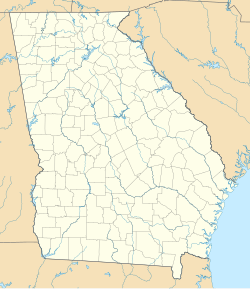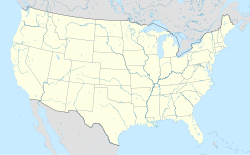Eatonton, Georgia
Eatonton | |
|---|---|
 Putnam County Courthouse in Eatonton | |
 Location in Putnam County and the state of Georgia | |
| Coordinates: 33°19′35″N 83°23′16″W / 33.32639°N 83.38778°W | |
| Country | |
| State | |
| County | Putnam |
| Area | |
• Total | 20.61 sq mi (53.38 km2) |
| • Land | 20.51 sq mi (53.12 km2) |
| • Water | 0.10 sq mi (0.27 km2) |
| Elevation | 568 ft (173 m) |
| Population (2020) | |
• Total | 6,307 |
| • Density | 307.52/sq mi (118.74/km2) |
| Time zone | UTC-5 (Eastern (EST)) |
| • Summer (DST) | UTC-4 (EDT) |
| ZIP codes | 31024 |
| Area code | 706 |
| FIPS code | 13-26084[2] |
| GNIS feature ID | 0331628[3] |
| Website | City of Eatonton |

Eatonton is a city in and the county seat of Putnam County, Georgia, United States.[4] As of the 2020 census, the city had a population of 6,307. It was named after William Eaton, an officer and diplomat involved in the First Barbary War.[5] The name consists of his surname with the English suffix "ton", meaning "town".
History
[edit]The Rock Eagle Effigy Mound, a Native American archaeological site, is located north of the city. It is one of two such sites east of the Mississippi River; both are in Putnam County. The mound and related earthwork constructions were made by Woodland culture peoples, perhaps as long ago as 1,000 to 3,000 years. The site is situated within a 1500-acre park administered by the University of Georgia, which also maintains a 4-H camp nearby. The Mound has been listed on the National Register of Historic Places.
Following the American Revolutionary War, Eatonton was founded in 1807 as the seat of newly formed Putnam County. After the war, settlers were moving west and settling in the upland Piedmont region to develop cotton plantations. Eatonton was incorporated as a town in 1809 and as a city in 1879.[6]
In a 5-hour period in May 1919, five black churches and two black lodges in Eatonton were burned to the ground, but authorities did not charge anyone with arson.[7]
On November 22, 1992, an F4 tornado with winds up to 260 mph hit the south portions of the city. The storm caused $27,000,000 in damages to houses and businesses. The tornado killed five locals and injured 86 victims.[8]
In the 21st century, Eatonton is known as the "Dairy Capital of Georgia" (in honor of its major industry, dairy farming).
Geography
[edit]Eatonton is located at 33°19′35″N 83°23′16″W / 33.32639°N 83.38778°W (33.326302, -83.387798).[9]
The city is located in the central part of the state along U.S. Routes 129 and 441, which meet in and form the western boundary of the city. Via U.S. 129/441, Madison is 22 mi (35 km) north. After leaving the city southward, U.S. 129 runs southwest 25 mi (40 km) to Gray and U.S. 441 runs southeast 21 mi (34 km) to Milledgeville. Georgia State Routes 16 and 44 are the main roads through the center of town, with GA-16 leading east 27 mi (43 km) to Sparta and west 18 mi (29 km) to Monticello, and GA-44 leading northeast 23 mi (37 km) to Greensboro.
According to the United States Census Bureau, the city has a total area of 20.7 square miles (54 km2), of which 20.6 square miles (53 km2) is land and 0.1 square miles (0.26 km2) (0.63%) is water.
Demographics
[edit]| Census | Pop. | Note | %± |
|---|---|---|---|
| 1840 | 516 | — | |
| 1860 | 2,009 | — | |
| 1870 | 1,240 | −38.3% | |
| 1880 | 1,371 | 10.6% | |
| 1890 | 1,682 | 22.7% | |
| 1900 | 1,823 | 8.4% | |
| 1910 | 2,036 | 11.7% | |
| 1920 | 2,519 | 23.7% | |
| 1930 | 1,876 | −25.5% | |
| 1940 | 2,399 | 27.9% | |
| 1950 | 2,749 | 14.6% | |
| 1960 | 3,612 | 31.4% | |
| 1970 | 4,125 | 14.2% | |
| 1980 | 4,833 | 17.2% | |
| 1990 | 4,737 | −2.0% | |
| 2000 | 6,764 | 42.8% | |
| 2010 | 6,480 | −4.2% | |
| 2020 | 6,307 | −2.7% | |
| U.S. Decennial Census[10] | |||
| Race | Num. | Perc. |
|---|---|---|
| White (non-Hispanic) | 1,976 | 31.33% |
| Black or African American (non-Hispanic) | 3,553 | 56.33% |
| Native American | 10 | 0.16% |
| Asian | 26 | 0.41% |
| Other/Mixed | 158 | 2.51% |
| Hispanic or Latino | 584 | 9.26% |
As of the 2020 United States census, there were 6,307 people, 2,559 households, and 1,756 families residing in the city.
Education
[edit]Schools in the area
[edit]The Putnam County School District holds grades Headstart to grade twelve, and consists of one primary school, an elementary school, a middle school, a high school, and an alternative school.[12] The district has 165 full-time teachers and more than 2,474 students. Gatewood Schools, a private Christian school in the area serves children in grades K3-12.[13]
- Gatewood Schools (K3-12)
- Putnam County Primary School
- Putnam County Elementary School
- Putnam County Middle School
- Putnam County High School
- Putnam County Achievement Academy
Notable people
[edit]Vincent Hancock, Olympic gold medalist in men's skeet shooting at the 2008, 2012, and 2020 Summer Olympics and Gatewood Schools graduate, resides in Eatonton.[14]
The city is the birthplace of noted writers: Joel Chandler Harris, journalist and author of the Uncle Remus stories, 19th century poet Louise Prudden Hunt (Mrs. B. W. Hunt), Henry Grady Weaver, author of The Mainspring of Human Progress, and Alice Walker, author of the novel The Color Purple and other fiction.
Artist and leading scholar, curator, and promoter of African American art David Driskell was a native of Eatonton.
S. Truett Cathy, founder of Chick-fil-A fast food restaurant and franchise, is a native of the town.
Thomas Adiel Sherwood, Justice of the Missouri Supreme Court from 1873 to 1902, was born there.[15][16]
References
[edit]- ^ "2020 U.S. Gazetteer Files". United States Census Bureau. Retrieved December 18, 2021.
- ^ "U.S. Census website". United States Census Bureau. Retrieved January 31, 2008.
- ^ "US Board on Geographic Names". United States Geological Survey. October 25, 2007. Retrieved January 31, 2008.
- ^ "Find a County". National Association of Counties. Archived from the original on July 12, 2012. Retrieved June 7, 2011.
- ^ Krakow, Kenneth K. (1975). Georgia Place-Names: Their History and Origins (PDF). Macon, GA: Winship Press. p. 68. ISBN 0-915430-00-2.
- ^ Hellmann, Paul T. (May 13, 2013). Historical Gazetteer of the United States. Routledge. p. 228. ISBN 978-1135948597. Retrieved November 30, 2013.
- ^ McWhirter, Cameron (2011). Red Summer The Summer of 1919 and the Awakening of Black America. Henry Holt and Company. p. 53. ISBN 9780805089066.
- ^ Brown, Ronald (1993). The Widespread November 21-23, 1992, Tornado Outbreak: Houston to Raleigh and Gulf Coast to Ohio Valley. p. 18.
- ^ "US Gazetteer files: 2010, 2000, and 1990". United States Census Bureau. February 12, 2011. Retrieved April 23, 2011.
- ^ "Census of Population and Housing". Census.gov. Retrieved June 4, 2015.
- ^ "Explore Census Data". data.census.gov. Retrieved December 18, 2021.
- ^ Georgia Board of Education[permanent dead link], Retrieved June 25, 2010.
- ^ School Stats, Retrieved June 25, 2010.
- ^ first Olympic champion to repeat in men's skeet "U.S. wins gold in men's and women's skeet shooting at Tokyo games". CBS News. July 31, 2012. Retrieved July 26, 2021.
{{cite web}}: Check|url=value (help) - ^ "Missouri Jurist Born 96 Years Ago", The Missouri Herald (June 6, 1930), p. 1.
- ^ "Biographies of the Gentlemen Comprising the Democratic State Ticket", The St. Joseph Weekly Gazette (August 3, 1882), p. 7.




